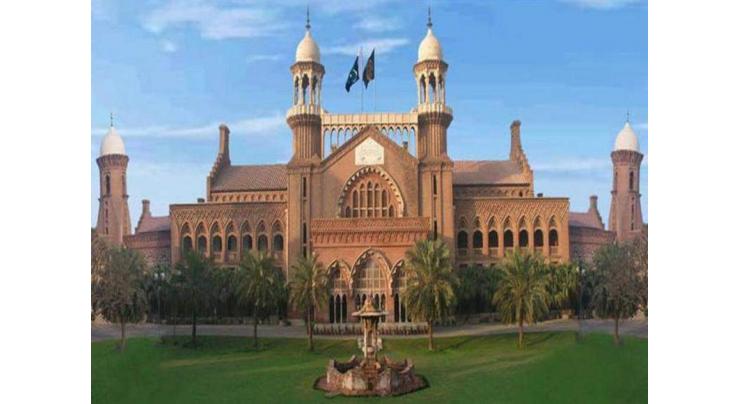
Private Schools Fee: Lahore High Court Declares Mechanism For Fee Valid
Faizan Hashmi Published April 05, 2018 | 11:44 PM

A Lahore High Court full bench on Thursday declared Section 7-A of the Punjab Private Educational Institutions (Promotion and Regulation) Ordinance, 1984, mechanism for determination of fee of private educational institutions, valid.
LAHORE, (UrduPoint / Pakistan Point News - 5th Apr, 2018 ) :A Lahore High Court full bench on Thursday declared Section 7-A of the Punjab Private Educational Institutions (Promotion and Regulation) Ordinance, 1984, mechanism for determination of fee of private educational institutions, valid.
However, the bench struck down the restrictions imposed on private schools over enhancing fee including complete bar on increase of fee for academic year 2015-2016, bar on increasing fee more than 5 percent for academic year 2016-2017 and bar on increasing fee more than 8 per cent for academic year 2017-2018, after declaring the same as unreasonable and ultra vires of the Constitution.
The court asked the private schools, who increased fee for academic year 2015-2016 or increased fee beyond 5 per cent for academic year 2016-2017 and increased fee more than 8 per cent for academic year 2017-2018, to provide justification for doing so within a period of 30 days to the authority concerned.
If no supportive material is provided or justification is not approved by authority, then the additional fees will be returned to parents or adjusted, it added. The full bench comprising Justice Abid Aziz Sheikh, Justice Shahid Karim and Justice Shams Mehmood Mirza passed the orders while disposing of petitions filed by private schools including The City School against restrictions imposed over enhancing fees under sub-clauses of section 7-A of the Punjab Private Educational Institutions (Promotion and Regulation) Ordinance, 1984 and its later amendments.
Some of the students through their parents also filed petitions for directing the private schools to charge the fee in terms of Section 7-A of the Ordinance 1984. The court after hearing arguments of the parties had reserved the judgment and it was announced today in open court.
The bench further directed the provincial government to notify within reasonable time "The Punjab Free and Compulsory Education Act, 2014" to ensure enforcement of fundamental rights of education under Article 25-A of the Constitution and also responsibility of private schools under section 13 of said Act.
The bench also directed the government to frame uniform regulatory regime through rules under section 13 of the Ordinance of 1984, within 90 days to determine the increase claimed by schools in fee by considering the quality of teachers, increase in utility bills, rent and other factors.
The registering authority shall also ensure that parents are not compelled to purchase text books, uniform or other material from a particular vendor or provider and schools do not charge any amount other than tuition fee, admission fee or prescribed security from the parents, it added.
The registering authority shall give representation to parents of private school children in the proceeding of increase in fee and such proceeding shall be done in open and transparent manner, it added.
An effective parents,students complaint handling procedure be established by using modern information technology, it added. Earlier, the petitioners' counsel questioning the restrictions imposed on private schools over enhancing fees submitted that the petitioners had right to carry out their business of private schools and the State at best in order to promote free competition could regulate business through licence in a reasonable manner.
They submitted that Section 7-A of the Ordinance 1984 had gone beyond the licensing system and was actually controlling the business of the petitioner in arbitrary manner. They contended that under Article 18 of the Constitution, only reasonable restrictions could be imposed but impugned legislation is not only unreasonable but also amounts to deprive the petitioners of their business.
However, the counsel for parents submitted that running of educational institution being a "trade" could be regulated by the State through a licensing system under Article 18 of the Constitution.
They argued that the requirement of registration of school under the ordinance amounts to issuance of licence, therefore, the State could regulate the private institutions as well as their registration. They further argued that the impugned legislation was neither discriminatory nor it amounts to deprive the petitioner from their right of property.
Related Topics
Recent Stories

Israel carries out attack inside Iran, report US media

Saudi Assistant Minister of Defence calls on army chief

Currency Rate In Pakistan - Dollar, Euro, Pound, Riyal Rates On 19 April 2024

Today Gold Rate in Pakistan 19 April 2024

Rock-solid Ruud racks up season-leading win in Barcelona

At UN, Iran says it will make Israel 'regret' reprisals

G7 hears calls for 'critical' Ukraine aid

EU seeks to leverage might to confront China, US challenge

5 Customs officials martyred as their vehicle ambushed by terrorists in D I Khan

Pak-New Zealand match called off due to rain

NHA restores traffic on roads affected by recent rains in Balochistan

China to fully support Pakistan's efforts against terrorism: Ambassador Jiang
More Stories From Pakistan
-
Spring Flower Show attracts students in Agri University at large
26 seconds ago -
Election campaigns for by-poll in four KP constituencies end: EC
31 seconds ago -
Police pays tribute to late officer Rubina Shehbaz at her funeral prayer
35 seconds ago -
Girl killed; house destroyed in landslide
44 seconds ago -
Rains, thunderstorms to continue in KP
11 minutes ago -
KPRA, USAID-ERDA arrange on the spot registration facility for women entrepreneurs
11 minutes ago
-
ICP continues crackdown against smoke emitting vehicles
11 minutes ago -
Heavy rain in Peshawar, suburbs continue
51 minutes ago -
Sargodha receives rain
51 minutes ago -
SABS University expels deputy director from service on harassment charges
1 hour ago -
Attack on foreign nationals convoy foiled
1 hour ago -
Public property worth a billion retrieved in Muzaffargarh
1 hour ago